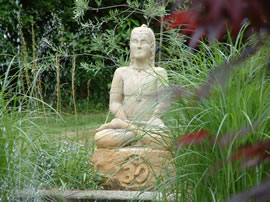Path of True Yoga – Swami Indrananda
As we all know Yoga is a method of perfecting oneself as well as an art regarding how to live in the world. Its path is hazardous and it can be very difficult to surmount the dangers that an aspirant has to come across on his/her way. At the end of a very long sermon in the battle of Kurukshetra, Lord Krishna advises Arjuna, a man of wisdom, knowledge and devotion, that:
Idam te na’tapaskaya na bhaktaya kadacana
Na ca ‘susrusave vacyam na ca mam yo bhyasuyati
This is never to be spoken by you to one who is devoid of austerities, nor to one who is not devoted, nor to one who does not do service, nor to one who speaks ill of Me. (Ch.18, 67).
Sri Swami Chidbhavananda Ji says in his commentary on this verse that Bhagavad-Gita is a synthesis of all principles governing the ethical and spiritual life of a man. The Lord’s supreme motive is to make these teachings available to all aspirants. However, this sacred science serves no useful purpose whatsoever when it is made a cheap affair by those who are flippant and disingenuous with it. The teachings of the Gita do no good to those who are devoid of austerity and a disciplined life. Furthermore, Swamiji stresses that even a disciplined life is not an end in itself until it is directed to the cultivation of service to others and devotion to the Lord. Finally, he says that anyone who is lacking of austerity, devotion, service, and faith in the inherent Divinity of man derives no benefit from the pursuit of the Bhagavad-Gita.
Therefore, it is clear that the true path of Yoga can only be followed by an aspirant who can go through the austerities, as laid down in the scriptures, and follow the physical, mental, moral and spiritual disciplines.
In order to lead others, it is of utmost importance that these disciplines are followed in order to teach from personal experiences.
However, it is observed in our time that teachers and aspirants are both falling short of maintaining the required discipline. The general view is that the teachers have no time for their own practice as they are too busy teaching, and cannot therefore lead their students by example.
Yoga is a practical way of living, and intellectual knowledge or an ability to teach others will be of no avail unless and until one can maintain all the above disciplines.
In olden days the student/disciple had to stay with the Master/Guru for a number of years to learn the practices and follow them up with complete discipline. But, in our time, the eternal science of Yoga is being popularised and marketed through the flashy magazines produced by some highly respected Yoga organisations. I was once told by one teacher/Guru/Master “you can’t win in the field of Yoga and attract disciples/students without proper advertisement…or the business will fall apart.”
We seem more attracted to postures displayed by actresses and others than in understanding our own body or to understand the physical discipline of yoga.
There are steps in achieving any goal in life. If we ignore these steps we will fail in our efforts to reach the goal. Hence the scriptures point to us the right way to follow. Hatha Yoga Pradipika shows us to maintain the physical discipline and Raja Yoga helps us to understand our mind (and not of others). It states in Patanjali’s Yoga Sutras “Yogish Chitta Vritti Nirodha” (Ch1, 2) that unless we control the fluctuations of the mind, we cannot learn the science of Yoga. When our mind is attracted by various activities, we gather innumerable impressions that stay in the sub-conscious mind. Without getting rid of these distracting thoughts, we find it hard to concentrate on anything.
An appropriate conclusion to this article must be a story of the great Japanese Saint Confucius. One day, a great scholar who had heard of Confucius approached him for his teachings. In Japan, the honoured guests are invited for tea, and the devotees of the Master help him to entertain the guests. The girls prepared the tea and brought it to the Master who told them to go and he would serve it to the guest himself. The Master started pouring the tea into the cup of the professor, and did not stop even when the cup was full and overflowing. The professor was a bit confused, and sceptical of the ability of the Master to teach. With hesitation, he eventually did point it out that his cup was full and spilling out. The Master then gently pointed out to the Professor that your mental cup is so full with so many different ideas, there is no place to pour my ideas into it. Unless you empty and clean your cup, you will not be able to absorb any more.
The teachings of Yoga are to get rid of all undesirable thoughts and stick to the one that will guide us to reach our goal. It is futile to keep wandering here and there and wasting our most precious gift of time during this blessed life.
MAY THE LORD BLESS US WITH
WISDOM TO FOLLOW THE PATH
OF TRUE YOGA
Om Shanti Shanti Shanti Om
